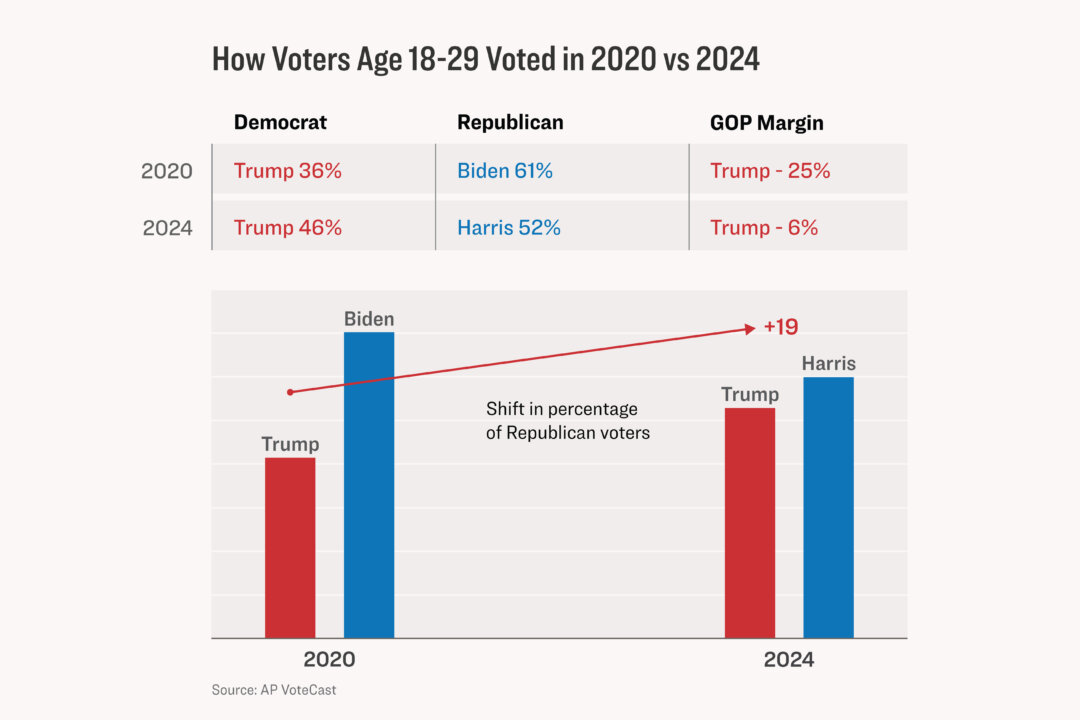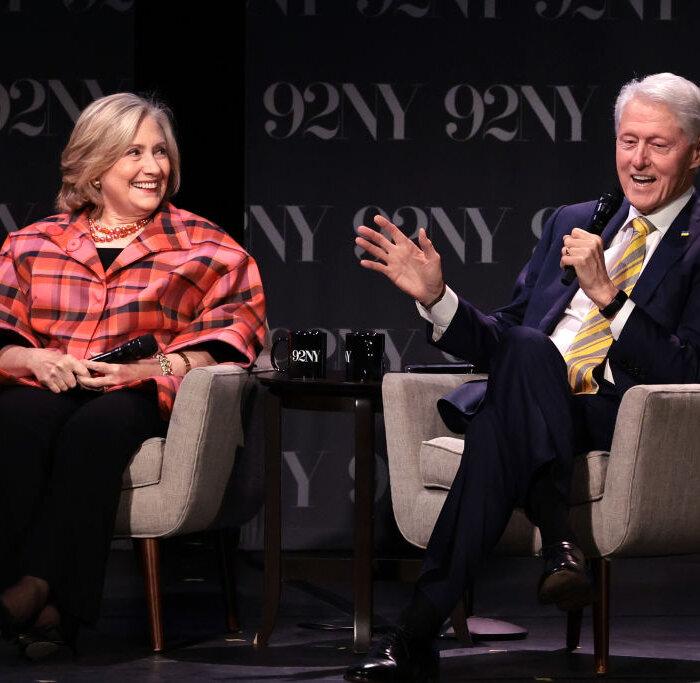News Analysis
President-elect Donald Trump has many people to thank for winning the election, but near the top of the list should be his young voters, who moved in great numbers toward the Republican since his last election in 2020.
While four years ago Gen Z—those aged 18–29—voted for President Joe Biden by a 25-point margin, this time around, they broke for Vice President Kamala Harris by six points only, according to an AP VoteCast exit poll.
A slight majority of Gen Z men, 49–47, went for Trump, according to the Edison Research exit poll.
There are multiple factors that likely caused that shift. Some quantifiable, others hardly so.
Elon Musk
While billionaire Elon Musk burned a chunk of his popularity by endorsing Trump, he remained popular among Gen Z with 25-point net favorability in an October YouGov survey compared to a 5-point net favorability overall.
Yet it may be less his technological accomplishments such as Tesla and SpaceX and more his online persona that young voters find likable. Musk often expresses himself in memes and with pop culture references popular with Gen Z. He also places a premium on authenticity—a trait appealing to Gen Z.
Last year, when interviewed by CNBC, Musk was asked why he shares his opinions online even when he knew many people wouldn’t like them and it has had some negative effects on his companies.
Musk paused for 12 seconds and then replied:
“You know, I’m reminded of the scene of the ‘Princess Bride’—great movie—where he confronts the person who killed his father and he says, ‘Offer me money, offer me power. I don’t care.’ … I’ll say what I want to say and if the consequence of that is losing money, so be it.”
While the 1987 movie came out many years before Gen Z was born, it’s the source of a number of popular memes Gen Z is familiar with.
Musk also has some bona fides with the gamer community. Just a day before the election, he divulged during his interview with popular podcaster Joe Rogan that he was among the top-rated Diablo 4 players, though the ranking is unofficial.

Memes
Trump appears to have an uncanny ability to produce meme-able content. Starting with his “you’re fired” trope on “The Apprentice” reality show, to his “you’d be in jail” jab during the 2016 presidential debate with former Secretary of State Hillary Clinton, through to his YMCA dance he has repeated on stage during his rallies, he has become a part of the meme culture.
During his debate with Harris, Trump said that Haitian immigrants were eating dogs and cats, a claim based on a handful of unconfirmed anecdotes. People turned his comments into songs and memes that quickly went viral. Even when the original intent was to mock Trump in many cases, his supporters embraced the meme, which then became the highlight of the entire debate.
After his election win, some people expressed the sentiment online that, although they may not agree with Trump, they are happy for the memes his presidency will likely produce.
The Harris campaign also had several viral moments, such as running with the comment by British pop singer Charli XCX that Harris was a “brat” or memes based on a quote she attributed to her mother last year: “You think you just fell out of a coconut tree?”
Those moments, however, seemed to have quickly faded, compared to some of the Trump memes that have been reused and resurfaced for years.

Podcasts
During his last several months campaigning, Trump gave more than a dozen podcast interviews, including long-form talks with Lex Fridman and Rogan. He also joined the “Bussin’ With The Boys” and Theo Von shows.
Podcasts are a popular source of information for Gen Z. They allow for a less scripted setting, which fits Gen Z’s preference for authenticity.
Harris gave several such interviews too, appearing on the “Call Her Daddy” show with Alex Cooper as well as the “All the Smoke” podcast and several radio shows. Her appearances, however, were shorter and more sporadic.
Need for Authenticity
Harris themed her campaign around “joy’—a poor match for Gen Z which has been described as the most cynical generation.
Harris’s interviews and media appearances often featured strictly scripted speeches and canned answers to pre-approved questions. Despite her notably improved presentation since her last presidential run in 2020, she still struggled to come across as authentic and comfortable in her skin.
Both inauthenticity and emotional pathos play into the kryptonite of the Gen Z generation—cringe.
Just days before the election, the Harris campaign went as far as releasing her own game map for the online game Fortnite. Pushing the candidate into the youngster gaming subculture could easily come across as forced and out of place.

“There is something really funny about the Harris campaign designing an incredibly banal Fortnite map that appears to be aimed at 5-year-olds who I am pretty sure can’t vote,” wrote gaming journalist Paul Tassi for Forbes.
The Harris campaign’s focus on concerts and celebrity endorsements also received limited play with Gen Z, which tends to trust online influencers more than celebrities.
Even the biggest celebrity endorsement, from Taylor Swift, likely had a limited impact since she’s more popular with millennials than Gen Z to begin with.
Distrust and Rebellion
Gen Z has been growing up during the proliferation of woke culture. Especially for young men, that means being told they are the beneficiaries of patriarchy and de facto oppressors.
Meanwhile, some research indicated that Gen Z has been hit by the COVID-19 pandemic particularly hard, weakening its trust in the government, authority, and institutions in general.
Trump’s anti-establishment position appears more attuned to said distrust and encourages rebellion against the woke orthodoxy.
Harris, on the other hand, has been one of the most progressive politicians, very much on board with the woke ideology.

Economy
Even though young people tend to be less concerned about the economy than older people, they still considered it a crucial issue for their vote, more so than health care or abortion, an October Gallup poll showed.
Gen Z, in particular, tend to be careful spenders, which may make them more susceptible to economic worries.
Inflation, one of the top economic concerns of recent years, hits lower earners the hardest, and young people tend to earn less. They’re also more likely to hold tipped jobs, matching well one of Trump’s signature proposals of eliminating federal income tax on tips.




